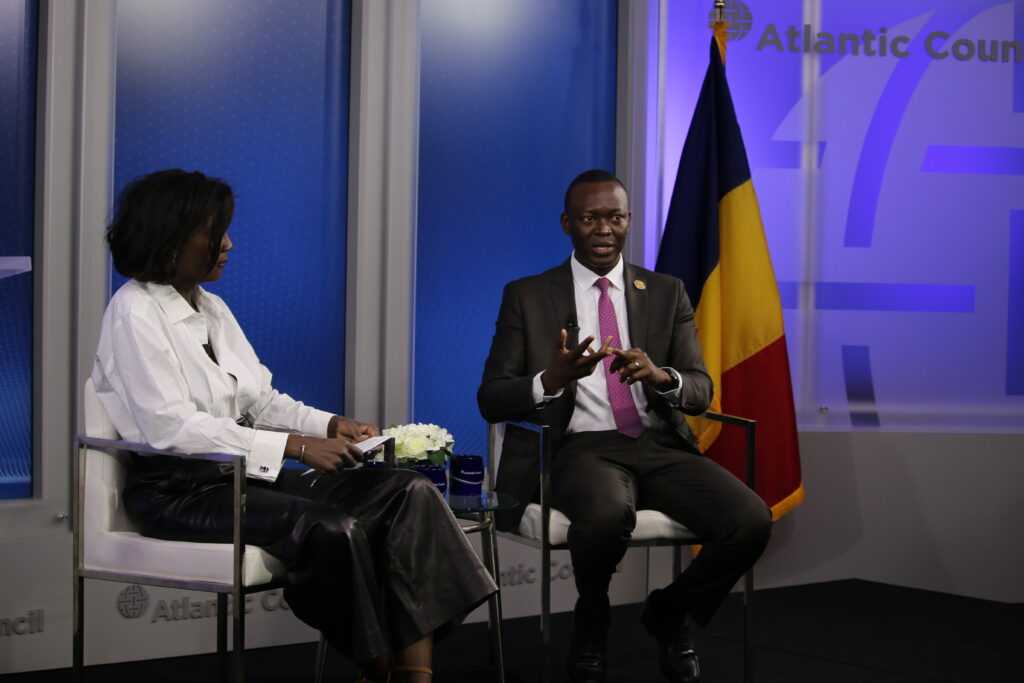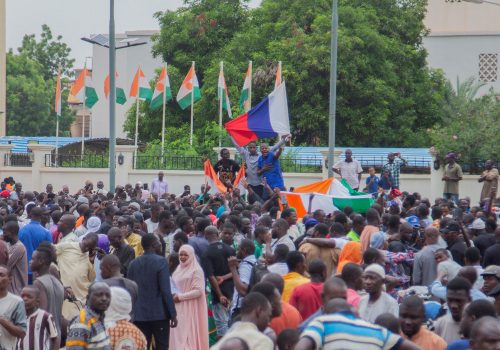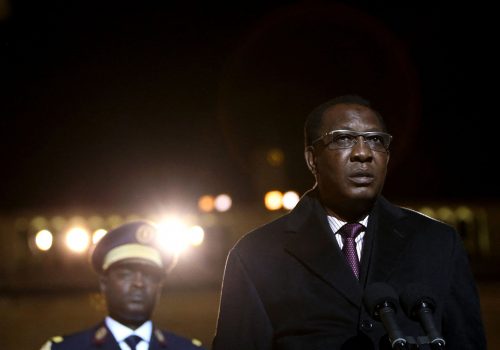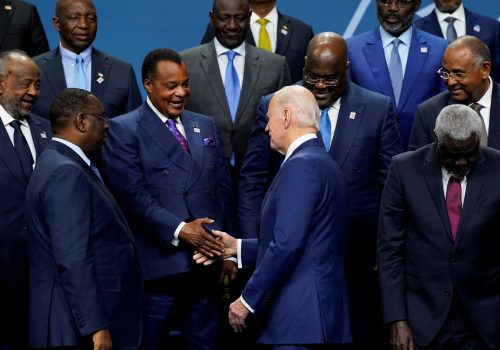Watch the full event
Freedom of assembly, freedom of opinion, and democracy are not just American values, “they are human values. They are also African values,” said Succès Masra, the prime minister of the Republic of Chad, on Wednesday.
Formerly the leader of the opposition Transformers party, Masra fled to the United States in the aftermath of the “Black Thursday” crackdown on dissent by the military government in October 2022. Now, after negotiations between the opposition and Chad’s government brokered by the Democratic Republic of Congo, Masra has returned to his home country and was appointed prime minister of Chad’s transition government in January. In this role, Masra has been working toward Chad’s democratic transition and reforming the country’s governmental and electoral institutions. Masra has yet to announce whether he will be a candidate in the May 6 presidential elections.
Molly Phee, assistant secretary for African affairs at the US Department of State, opened the conversation with Masra, urging the international community to support Chad’s transition government as it seeks to build stronger, more inclusive, democratic institutions and serve as an example throughout the region. Below are more highlights from Masra’s discussion of Chad’s democratic transition, economic ambitions, and the role the country should play in the region, which was moderated by Rama Yade, the senior director of the Atlantic Council’s Africa Center.
Democratic transition and reforms
- Masra said that the transitional government’s first priority was establishing governmental and electoral institutions. “Unless we have strong institutions, nothing sustainable can happen,” he said. The war in Sudan, he added, showed that “if everybody has weapons, it’s not enough to build a strong country. It’s important to make sure that institutions are also here to help.”
- These institutions include a new independent body for organizing elections and a reform to enhance the independence of the judiciary. “These are new tools that we are putting on the table to push for fair elections,” Masra said.
- Another aspect of the electoral reform initiatives is to “push for citizen involvement,” said Masra. “Our ambition is to train fifty thousand volunteers” to help with the elections in the next few weeks, he said, which will require help from institutions in the United States, civil society actors, and members of the African diaspora.
- “But we still have challenges ahead,” Masra acknowledged, which include financing the electoral process. “This is where we can also expect some support.”
Economic goals
- Masra outlined an initiative for “minimum development packages,” which would ensure that every village has a school, health system, clean water facility, road, and access to energy. Unless Chad “bets on education,” Masra said, “there is nothing sustainable we can accomplish yesterday, today, or tomorrow. The world is led by ideas.”
- “We want a Chad which could become tomorrow’s startup nation,” where both local and international actors want to invest, said Masra, who was formerly the chief economist at the African Development Bank. “This is not about philanthropy. This is about business.”
- Masra also highlighted the importance of facilitating trade among African countries, including promoting e-visas, ensuring free travel, expanding regional markets, and making the most of the African Continental Free Trade Area.
Chad’s international role
- Concerning the series of coups in the Sahel countries of Niger, Mali, and Burkina Faso, Masra said that “the reality of security and the obligation for leaders to respond to people’s needs remain the same.” Even during war, “people should continue to talk,” he said. “We speak to everybody, with the idea to use Chad as a regional player.”
- “The United States is a partner for our country, and I’m here to say we want to build a stronger partnership,” said Masra. Ongoing areas of cooperation between the United States and Chad, he said, include security, private sector development, and “pushing for a soft landing” in Chad “where people can choose their leaders.”
- “Africa must unite. This is mandatory,” Masra said, urging greater African involvement in global institutions. That means “it’s important to have a place” in the United Nations Security Council, he added.
- Before concluding, Masra called for “hope” for Chad, stating that “there is a new Chad, a new Africa, and we can build bridges” together.
Watch the full event
Further reading
Thu, Aug 3, 2023
What Niger’s coup means for West Africa’s geopolitical contest
New Atlanticist By Rama Yade
The ongoing coup in Niamey and others that have taken place in West Africa in recent years reflect significant geopolitical changes underway.
Tue, Apr 20, 2021
FAST THINKING: After the death of its president, Chad is on the brink
Fast Thinking By
After three decades in power, Chadian President Idriss Déby was killed following clashes with insurgents, state media announced Tuesday. What’s next for the country after the fall of its long-ruling autocrat?
Mon, Mar 13, 2023
The US has gotten the day to day right in Africa policy. Time to think bigger.
AfricaSource By Aubrey Hruby
The Biden administration’s commitment to high-level engagement with African leaders is welcome, but its recent US-Africa Leaders summit should have been a launch pad for big, bold ideas.
Image: Succès Masra, the prime minister of Chad, and Africa Center Senior Director Rama Yade at an Atlantic Council event on February 28, 2024.



